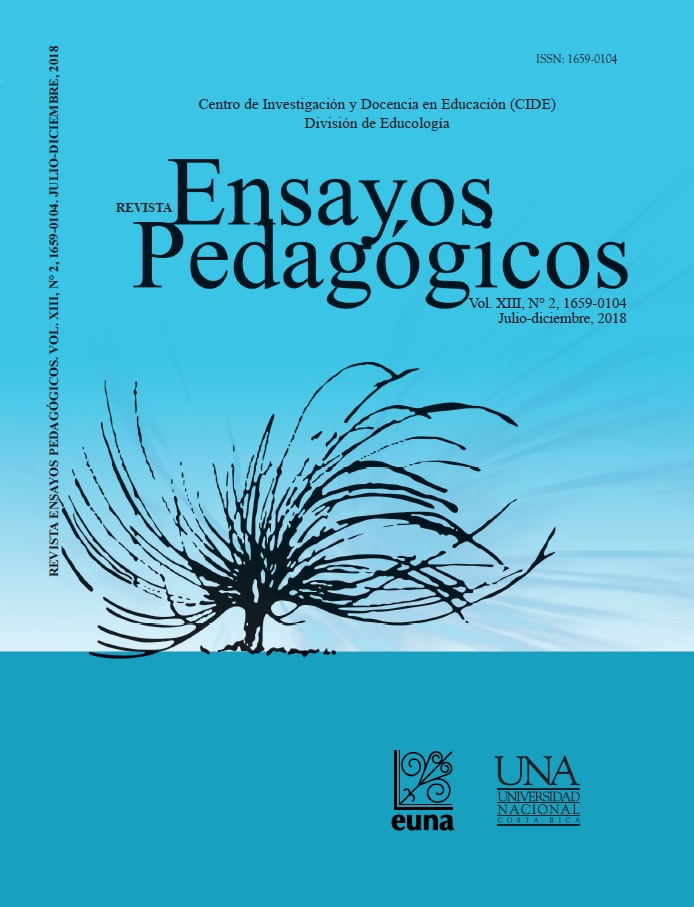Avatars of the Principle of Pleasure and the Principle of Reality in Education
DOI:
https://doi.org/10.15359/rep.13-2.3Keywords:
psychoanalysis, Freud, Education, principle of pleasure, principle of realityAbstract
Sigmund Freud in his Autobiographical Presentation (1925) explicitly warns that he did not write anything about education; however, he says that the discoveries achieved in psychoanalysis in the journey through the exploration of the unconscious have interested other disciplines including pedagogy. In the few articles in which Freud alludes to this topic, he speaks of education in terms of dreams and hopes; he generally conceives education as a kind of prophylaxis of neuroses and perversions; nevertheless, psychoanalysis would act a posteriori at a therapeutic level. Only in one of his article Formulations on the Two Principles of Psychic Accomplishment (1911) –principle of displeasure and pleasure and principle of reality– Freud assigns education a specific function; in his own words: “Education can be described, without hesitation, as the incitement to overcome the pleasure principle and replace it with the principle of reality” (1989a, p. 228). This brief thesis contains the essence of the humanizing power of education that enables the subject to enter the circuit of culture by putting a stop to the self-destructive impulses promoted by the pleasure principle. Analyzing this thesis is the purpose of this paper.
References
Cordié, A. (1998). El malestar en el docente. Argentina: Nueva Visión.
Epicuro. (s. f.). Carta a Meneceo. Recuperado de http://onomazein.letras.uc.cl/Articulos/4/23_Oyarzun.pdf
Freud, S. (1989). La moral sexual “cultural” y la nerviosidad moderna. En Obras Completas (vol. 9, pp. 159-181). Buenos Aires: Amorrortu. (Trabajo original publicado en 1908).
_________. (1989a). Formulaciones sobre los dos principios del acaecer psíquico. En Obras Completas (vol. 12, pp. 217- 231). Buenos Aires: Amorrortu. (Trabajo original publicado en 1911).
_________. (1989b). Introducción a Oskar Pfister. En Obras Completas (vol. 12, pp. 347- 353). Buenos Aires: Amorrortu. (Trabajo original publicado en 1913).
_________. (1989c). El interés por el psicoanálisis. En Obras Completas (vol. 13, pp.165-192). Buenos Aires: Amorrortu. (Trabajo original publicado en 1913).
_________. (1989d). Más allá del principio del placer. En Obras Completas (vol. 18, pp. 1-62). Buenos Aires: Amorrortu. (Trabajo original publicado en 1920).
_________. (1989e). El problema económico del masoquismo. En Obras Completas (vol. 19, pp. 161-176). Buenos Aires: Amorrortu. (Trabajo original publicado en 1924).
_________. (1989f). Prólogo a Augusto Aichhorn. En Obras Completas (vol. 19, pp. 296-297). Buenos Aires: Amorrortu. (Trabajo original publicado en 1925).
_________. (1989g). Presentación autobiográfica. En Obras Completas (vol. 20, pp. 1-66). Buenos Aires: Amorrortu. (Trabajo original publicado en 1925).
_________. (1989h). Conferencia Un. 34: Esclarecimientos, aplicaciones y orientaciones. En Obras Completas (vol. 22, pp. 126-145). Buenos Aires: Amorrortu. (Trabajo original publicado en 1933).
Lacan, J. (1985). El Seminario de Jacques Lacan libro 20 Aún. Barcelona-Buenos Aires-México: Paidós.
Melville, H. (1998). Bartleby, el escribiente. (Trad. J. L. Borges). Madrid: Alianza.
Portilla, J. (1997). Fenomenología del relajo. México: Fondo de Cultura Económica.
Vygotsky, L. (2008). El desarrollo de los procesos psicológicos superiores. Barcelona: Biblioteca de Bolsillo.
_________. (2015). La imaginación y el arte en la infancia. México: Ediciones Coyoacán.
Published
How to Cite
Issue
Section
License
Ensayos Pedagógicos is subscribed to the Attribution-NonCommertial-NoDerivatives 4.0 International Creative Commons Licence, which allows both authors and readers to freely download, store, copy, and distribute the final approved publisehd version of the manuscript (post-print) as long as this is done without commercial purposes, no derivative works are generated, and the source and author are mentioned. As well, Ensayos Pedagógicos declares that authors will remain the rightful owners of the copyrights of their work in perpetuity.







